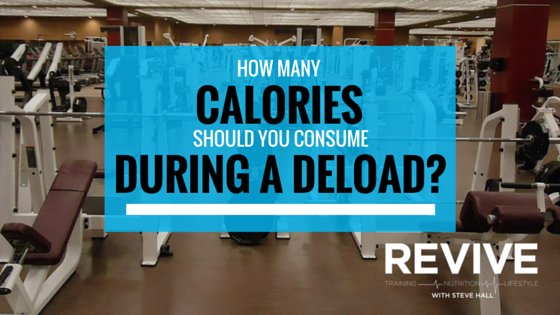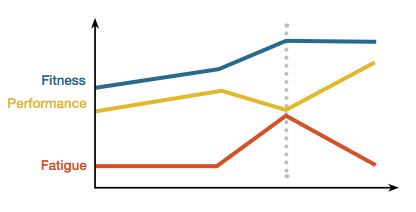
Revive Stronger
How Many Calories Should You Consume in a Deload?

Eughhhhh it’s time to deload, we’re a bit beat up and tired…
Lighter weights.
Short workouts.
But we know they need to be done, I mean they’re in the most successful programmes.
However, if we’re working less hard and are in the gym for less time, won’t we burn fewer calories? — So if we’re dieting couldn’t this take us out of a calorie deficit, and if we’re not trying to lose weight could it not lead to potential unwanted weight gain???
We should cut our calories.
Table of Contents
What is a Deload?
Before we make our decision let’s look at what a deload is; a week(s) of reduced volume and or frequency. Or in others words; when we deload we do less work at potentially lower intensities.
[bctt tweet=”A deload is a week(s) of reduced volume and or frequency”]

Deload weeks can be set up in a multitude of ways, and different methods can be used at a variety times, but they’re always ‘light’ in comparison to our usual training. And by ‘light’ I’m not necessarily referring to the loads used, as they may still be fairly heavy, by ‘light’ I mean that the workouts are not fatiguing.
However, the single biggest contributor to fatigue is volume, so this must come down. [4]
Why do we Deload
Now we know what a deload is we need to know why we’re doing it, because it seems these weeks are in most popular programmes, so there must be some reasoning.
Think of your body as a bowl of grapes, every time you workout you take away a grape from the bowl, until eventually you have not grapes left. You’re scraping at the bottom of the bowl for grapes…bugger! Now you need to take a trip to the supermarket to re-fill your grape bowl…
Because if you leave it too long, you’ll get VERY hungry (because you only eat grapes).
Now think of the grapes as your pool of resources to train with, every time a grape is removed your fatigue levels accumulate, until eventually (after many weeks of hard training) you’re left with lots of fatigue and no resources to train with…
You’re run down.
You’re not sleeping very well.
You’re feeling pretty achy and your joints a little sore.

This is what is referred to in Sports Science as ‘overreaching’, a point at which your increases in fatigue are greater than your increases fitness, and this starts to bring down performance. [1] As you can see in the graph above, fitness and performance rise together initially with fatigue remaining level, but there becomes a point in which performance degrades due to rapidly increasing fatigue.
This is where your deload comes in; a period of time to refuel, repair, let your fatigue come down, to allow your performance rise and set you up for many more weeks of eating grapes (productive training) so you’re not left hungry (over-trained).
[bctt tweet=”Deloads are designed to reduce fatigue while conserving adaptations”]
Calories Burned during a Deload
So now we know what a deload is — a week of ‘lighter’ training and why we need to deload — recover and prevent overtraining, we can think about what calories would do.
Ask yourself the following question:
- Would lowering your calories help with recovery (the prime role of the deload)?
Simple answer here:
- No
You see now why I had to take you through what a deload is and why we use them, because with that understanding you now realise what cutting calories would do.
[bctt tweet=”Dropping calories in a deload would be like kicking you while you’re already down “]
But we’re exercising less so burning fewer calories???
I can understand why this would be a concern, especially for someone who is trying to lose fat, or maybe you’re gaining and don’t want to put on excess weight. However, let me explain why this isn’t really a concern; our total energy use (metabolic rate) comes down to a variety of factors (see the pyramid below):
As you can see our exercise (TEA) contributes little to our total daily energy expenditure (TDEE). In fact it has been found that a 90 minute, full body, resistance training routine where multiple sets of 10 reps with final set taken to failure burns 200-400 kcal on average depending on body size. [2]
Example:
Normal Training Week: 4 x 90 minute sessions burning 300kcal each or 1200kcal for the week
Deload Training Week: 4 x 30 minute sessions burning 100kcal each or 400kcal for the week
So you can see there are 800 fewer calories burned in the deload week from exercise alone, however, we must remember in those 60 minutes we’d normally be training, we’re still burning calories.
Sure we probably won’t be burning as many as when we workout, but its not like we suddenly switch off, we could easily be burning 50 to 200 calories depending on our size and what we’re doing. Walking down stairs has been shown to burn a comparative number of calories to weight training. [3]
Thus we can see that exercise actually doesn’t contribute very much to our total caloric burn, and so it isn’t really a concern.
Adjusting Calories on a Deload
The calories we burn do not drastically change during a deload week compared to a normal week of training — maybe we burn a couple of hundred fewer calories…not enough to really worry about.
So is there any need to adjust calories at all?
Fat Loss
Now think when we’re dieting we are continuously eating less than we need, thus recovery is hampered more than ever. So deloads become MORE IMPORTANT and dropping calories would be a bad idea and it will lead to the following:
- Increased risk of injury
- Remember when we lift we don’t just load our muscles but also our bones, ligaments and tendons.
- A reduction in performance
- Deloading again sooner than planned
All of the above will in the end lead to more potential muscle being lost and in the long run fewer calories burned, you know what that isn’t good for?
=> Fat Loss
So you reduced calories in your deload to help burn more fat, but that simple act has reduced your ability to burn fat and increased your chances of muscle loss. Calories should not be reduced during a deload, but doing so it will hamper your recovery and in the long-term degrade your progress.
[bctt tweet=”Calories should remain as per usual or even be increased”]
In a recent conversation with James Krieger (from weightology) we talked about doing deloads every 4 weeks when dieting and in that fourth week you actually increase calories to maintenance.
The point being to act as a diet break and have an even larger reduction in fatigue.

Muscle Gain
Now what about when we’re trying to gain lean muscle, we’re only in a slight surplus, so we can get big but stay lean.
- Drop Calories to Maintenance: During a deload week you’re training at lower volumes and burning fewer calories — the stimulus for growth isn’t there and so you should drop calories to maintenance levels.
My opinion on this has changed over the years, I had kept Calories level but now I like to see them come down to maintenance levels. This is because both my deloading and massing approaches have become more aggressive, and thus volume comes down a lot compared to the week prior to deload and the surplus is assertive, making coming to maintenance a good idea during the deload to avoid fat gain.
Calories during a Deload in Summary
- A deload is a week(s) of reduced volume and or frequency
- Deloads are designed to reduce fatigue while conserving adaptations
- Exercise doesn’t contribute very much to our total caloric burn, and so it isn’t really a concern.
- For fat loss; calories should remain as per usual or can be raised to maintenance.
- For muscle gain; calories can drop to maintenance.
WHAT NEXT?
Do you need any help with the above? Do you have any questions you need answering? Do you need more clarification on deloads?
Join my free facebook group or add me on snapchat (revivestronger) and ask your question there, I will respond asap.
If you want to learn more about how planning your workouts could lead to better results please read: Periodisation for Progress
One more thing…
Do you have a friend who you think needs to take deloads or could be training too hard (or soft)? Share this article with them and let me know what they think.
[bctt tweet=”How Many Calories Should You Consume in a Deload??”]
References
- Pistilli, E.E., et al., Incorporating one week of planned overreaching into the training program of weightlifters. Strength & Conditioning Journal, 2008. 30(6): p. 39-44.
- Ballor, DL, et al, Resistance weight training during caloric restriction enhances lean body weight maintenance. Am J Clin Nutr, 1988 47(1): p 19-25
- Calculations are based on research data from Medicine and Science in Sports and Exercise, the official journal of the American College of Sports Medicine.
- M, Israetel. J, Hoffmann. C, W, Smith. Scientific Principles of Strength Training. 2015
We are a personal coaching service that helps you achieve your goals. We want you to become the best version of yourself.







4 thoughts on “How Many Calories Should You Consume in a Deload?”
It’s going to be ending of mine day, however before end I am reading this enormous piece of writing to improve my knowledge.
Hi,
During my training i do MRT and push myself to the limits 4 time’s a week to reach hypertrophy. I’m in a calorie defecit but a small one (10-15% of my TDEE). Every Saturday I have a refeed day where I just up all of my macros but still not to my TDEE; more of a fun day with bigger portions! I’d like to know if I can still do this on a deload week… I train everyday on a circuit of 5x pull ups, 10x push ups and 15x squats for 10 rounds so that I’m warmed up but not out of breath.
Comments are closed.